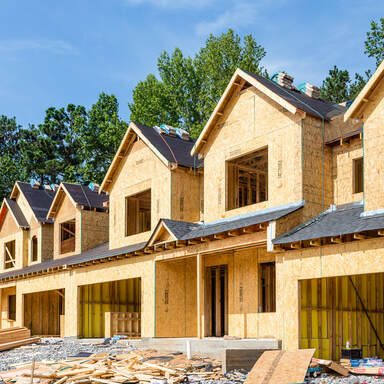|
This blog post was originally written in October 2019, and I've gone through to review and update it ever so slightly for today's reality. Oddly, not that much has changed! Enjoy... After working long and hard on the concept, design, plans, drawings and such with an architect, who would've thought that finding the contractor to execute the plan would take even longer and be even more overwhelming? First, a little bit about our experience here on our Juniper Hill Cottage project. And finally, we've got some insight on what we would have done differently, and a few tips for you to consider. I realize that we sorta skipped over the design process here, but I promise we'll get to that in another blog post -- look for an article soon where we talk to some architects about the ins and outs.
|
| In our case, we had a pretty good idea of what we wanted to accomplish and this wasn't the first time through on a construction project for either of us. We chose to jump right in with an architect so as to fine tune what we were going to do, with the idea that we would then be ready to shift into execution mode. |
As we began to come to big decisions on the scope of the project, we felt a little lost without being able to get input from the contractor that we would actually work with. For us, there was no point in coming up with the design of our dreams if it wasn't going to be feasible to actually build.
Having access to a contractor's insight, so that we could determine if what we were thinking was even feasible within our budget and limitations of our lot would make the final project plan more realistic. Additionally, once approved by the City, our plans would be the end goal of every inspector that showed up during construction. So, making changes after the approval of plans, once we had a contractor, would be costly, and very problematic.
We started to talk to contractors in order to get them in the loop before the plans were finalized and submitted to the City.
But when we tried to get connected with several contractors, they all told us: "Give me an approved set of plans and we will take a look and let you know our thoughts."
We were stuck in this crazy loop -- which comes first? The contractor? Or the plans?
too much work to go around
| It used to be that construction and remodels were a very stable way for a contractor to earn a good living. And then the big recession hit in 2008. Most of the architects and contractors in town moved on to other larger communities or even other careers in order stay afloat. Apparently, even all these years later, there is still a limited number of truly qualified professionals in the area. |
The landscape in Prescott, where we live, is now one of extremely high building demand, limited city and professional resources, and most of all that is connected to new custom builds in wide open lots on the perimeter of the core city. We have an enormous influx of relocations from California, with California money and new construction is what they want.
Why would a contractor or architect want to work on the renovation of a small, old home in a very tight lot in the historic part of town with a client who has an actual (as in, "real") budget?
We found ourselves at a real disadvantage, while at the same time we were looking for a truly special contractor who actually liked renovation projects and understood older homes.
In the end, we ended up just moving forward with the architect to complete the plans, using our best guess as to what would be feasible. And, it took a while...
timeline to get to the starting line
Funny thing.
We expected the city process to blow the whole thing up. We had been warned time and again by everyone in town that it was a total nightmare to get through the city to an approved set of plans and there was no way to anticipate or manage it.
In the end, it only took them less than 4 weeks to review and they approved it all in one step - no issues, questions, amendments. Amazing.
All told, entire process from concept to get approved plans was 20 months.
The permit had to be pulled within 6 months before it would expire. No problem we thought!! We should be able to finish our contractor search by then. Oh boy....
so, now for the contractor search
- One contractor seemed like a really nice guy, came highly recommended but didn't seem to have much of a process in place to address making a well thought out proposal. Pretty much said he was just going to wing it. -- Really?
- One contractor showed up with a very impressive business process, book of work, and "system" only to end up submitting a timely but outrageous proposal, and then not being willing to discuss any of the project elements in detail because he said it was "proprietary". Again -- Really??
- Another contractor was a really great guy, but his proposal consisted of a bullet point list in an email, and his approach to the entire project was essentially like working on a new build. Just tear it out and start over. -- Oh no!
- And yet another contractor came in with a long and established local career, and was easy to talk to. But then took literally 6 months to finally submit a proposal that left us with so much confusion and so many questions that we really had no idea what to expect. The list of questions was longer than the proposal itself. -- Seriously?
And after all that, we actually found ourselves up against the permit deadline with the city, with no one to do the work.
| We had to beg the city to extend the permit deadline... to give us more time to find a contractor. They gave us 8 more weeks. At that point, it turns out, significant building code changes were going to go into effect. We had to meet this new deadline, or risk having to resubmit a NEW set of plans to the city after that date. |
Stress! Frustration. Feeling defeated.
It had now been 8 months since we got our plans approved. Eight months!
We were so frustrated and strung out with the whole process that we contemplated just skipping the whole renovation as the extended permit deadline loomed.
glad we didn't give up
He couldn't recommend them more highly. He made a call, we had a meeting, they got us a preliminary, straight forward proposal, and they were able to get that permit pulled just hours before the extension expired.... pheww!
We broke ground on the initial outside work 10 months after getting our plans approved.
* * * So doing the math, that's 2 1/2 years from concept to breaking ground. * * *
And, here we are, several months later, well on our way and we could NOT be happier. We can look back at this now and feel very fortunate to have ended up with the right folks to execute the plan. We kinda lucked out that this windy road got us to where we are now...
But, did it have to be that exciting?!?!
Maybe not. Here's what we learned...
lessons learned
1. Always establish your budget up front
- Communicate this to everyone you talk to very clearly.
- Be prepared to ask for feedback as you go along and adjust your budget or your scope accordingly. Multiple sets of input will help you here. There is never one, perfect truth here. Too many variables.
- Let's face it, no one ever budgets realistically out of the gate, so be prepared to do math and be direct.
- This process will take some time, so allow for that.
2. Begin Contractor discussions early
- Decide if you really need a general or can just hire subs (we'll have another blog post up on this soon.)
- Find one that you trust and can work with -- do your homework, check references, ask to see and understand the contract/billing process, look at other projects in person, etc.
- Scope out the concept of your renovation in broad brush strokes.
- A good contractor should be able to help you figure out how to address ideas and challenges during the design, development and permitting process - but they do NOT replace that meaningful process.
- Arrange to pay for their time during the design and development phase if you have to. It's worth it!!
3. Bring in your Architect, or Designer, or Draftsman as appropriate
- Determine the best resource to get your plans prepared to meet your city planning department requirements and, of course, your contractor's needs. (Look for a blog post on how to find the right architect soon.)
- Hint: Often, unless you are building a new home, you really do NOT need an architect. A good designer is often more than capable of getting your creative solutions and renderings put together along with the help of structural engineers and other specialties as needed.
- You should budget anywhere from 5 - 10% of your total budget for this work
4. Finally, get your Contractor's input before you finalize and submit your plans
- Major design and floor plan decisions
- Feasibility considerations in terms of site access, construction , subcontractor considerations
- Major budget gaps or concerns
- This may require some of their paid time depending on your arrangements with them
5. Submit you plans for approval/permitting -- be patient! And expect questions, comments, and the need to make edits on your plans.
6. Contractor Contract
- After the plans are approved by the city, and probably before they pull the permit
- Detailed, thorough and in writing
- Be sure you understand contract billing/payment terms
7. Plan on at least 6 - 12 months for the entire planning process which includes establishing your budget through to breaking ground on your construction. It's very possible that this can take twice that long. Sigh.
All of this assumes a couple of things:
- You have a pretty good idea of what you want to accomplish
- You plan to be pretty involved in getting the design worked out
- You don't have unlimited funds AND are willing to do some math
- You are planning to do more than just aesthetic improvements
Need help and support on your project?
We are highly qualified to help walk you through this entire process, as well as crafting a stellar custom design plan. And we love what we do!!
You can learn more about our Services, Portfolio, as well as Testimonials:
next up
See you on the porch,
~Miriam
WOW! What a process! You were wise to hang in there, although I think I might have been ready to give up too. I can see where it would be much more difficult to find a contractor willing to work within these parameters versus the larger open budget projects, but it's so important to keep some historical features in tact, like you're doing. I look forward to reading more about your process!
I like what you said about emailing bullet point items to your contractor. I need to get a contractor expand my kitchen. I'll have to talk to multiple contractors for quotes.
Leave a Reply.
Author
Hello! I'm Miriam and this is the story of our tiny historic cottage and it's complete renovation.
Categories
All
Artful Details
Design
D.I.Y.
Downsizing
Garden
Ibis The Yellow Lab
Kitchen
Planning
Video
Whiskey Porch







 RSS Feed
RSS Feed


